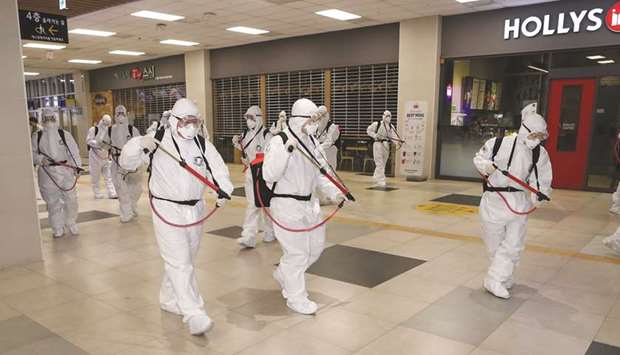South Korea reported its biggest surge in new coronavirus cases yesterday as concerns grew of a possible epidemic in the United States and the World Health Organisation raised its risk alert to its highest level.
The virus has rapidly spread across the world in the past week, causing stock markets to sink to their lowest levels since the 2008 global financial crisis over fears that the disease could wreak havoc on the world economy.
More than 2,900 people have died and over 85,000 have been infected worldwide since it was first detected in the central Chinese city of Wuhan late last year.
The vast majority of infections have been in China but more daily cases are now logged outside the country, with South Korea, Italy and Iran emerging as major hotspots.
South Korea has the most cases outside China, with 3,150 infections as 813 more patients were reported yesterday — the country’s biggest increase to date.
North Korean leader Kim Jong Un warned top party officials of the “serious consequences” of failing to prevent an outbreak on their side of the border.
The impoverished nation, with a weak and ill-equipped healthcare system, has closed its borders to prevent the spread of the disease into its territory.
The virus has also spread to previously untouched zones in recent days, reaching nine new countries including Azerbaijan, Mexico and New Zealand, as well as reaching sub-Saharan Africa with Nigeria reporting its first case.
“We have now increased our assessment of the risk of spread and the risk of impact of Covid-19 to very high at global level,” WHO chief Tedros Adhanom Ghebreyesus told reporters yesterday.
European nations are scrambling to contain the outbreak as new infections mounted in several countries — many linked to virus hotspot northern Italy — including in France where a surge of new cases was confirmed yesterday. The country cancelled all gatherings of more than 5,000 people — including a Paris half-marathon scheduled for today — after 16 new cases were confirmed yesterday, bringing the country’s total to 73.
“These measures are provisional and they will no doubt evolve.We want them to last a little, because it will allow us to contain the spread of the virus,” health minister Olivier Veran said. In the US, health officials reported three more cases of the new coronavirus transmitted to people who did not travel overseas or come in contact with anyone known to be ill, indicating the disease was spreading in the country.
There are now four such cases in the United States, all on the Pacific seaboard, in addition to some 60 other infections in the country.
“The virus is here, present at some level, but we still don’t know to what degree,” said Sara Cody, director of public health for California’s Santa Clara County, the heart of Silicon Valley where tech giants like Apple and Google are based.
US Federal Reserve chair Jerome Powell said the central bank was ready to intervene if needed, given the “evolving” risks to the world’s largest economy posed by the outbreak.
Official data released in China yesterday showed the extent of the damage caused to the world’s second-largest economy, with manufacturing activity falling to its lowest level on record as key industries ground to a standstill under drastic containment measures.
More global events were disrupted due to the epidemic, with the United States delaying a regional summit of the Association of Southeast Asian Nations due in Las Vegas next month. “This is not a time for panic. It is time to be prepared — fully prepared,” UN Secretary-General Antonio Guterres said.
South Korea’s epidemic is centred in its fourth-largest city, Daegu, whose streets have been largely deserted for days, apart from long queues at the few shops with masks for sale.
Three women in the Daegu area died of the illness, taking the national toll to 17, authorities said yesterday.
South Korea’s total is expected to rise further with screening of more than 210,000 members of the Shincheonji Church of Jesus, a secretive entity often accused of being a cult that is linked to around half of the country’s cases.
Yesterday, South Korea also reported its first reinfection case with a 73-year-old woman testing positive for a second time after recovering from the virus. While China reported 47 more deaths yesterday, it recorded 427 infections — fewer new cases than South Korea — following unprecedented quarantine efforts locking down tens of millions of people in the worst-hit cities.
South Korean officials say they are not considering a citywide quarantine for Daegu similar to the lockdown imposed on Wuhan.

South Korean soldiers wearing protective gear sanitise Daegu railway station in Daegu, yesterday.
